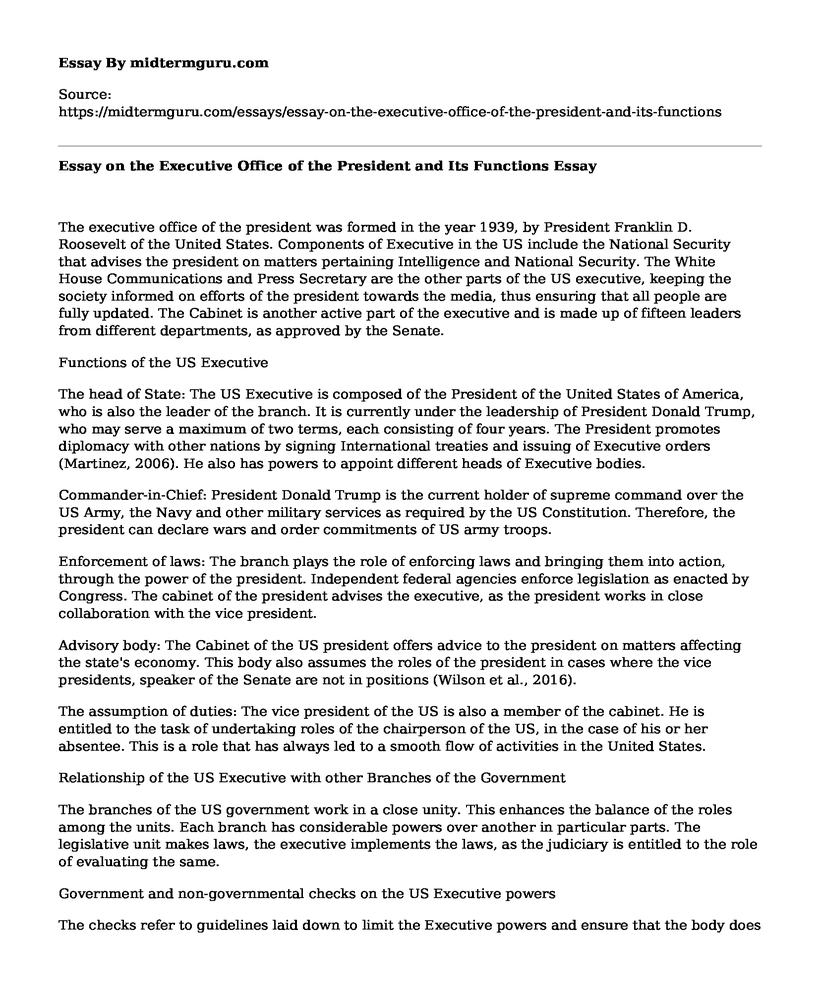The executive office of the president was formed in the year 1939, by President Franklin D. Roosevelt of the United States. Components of Executive in the US include the National Security that advises the president on matters pertaining Intelligence and National Security. The White House Communications and Press Secretary are the other parts of the US executive, keeping the society informed on efforts of the president towards the media, thus ensuring that all people are fully updated. The Cabinet is another active part of the executive and is made up of fifteen leaders from different departments, as approved by the Senate.
Functions of the US Executive
The head of State: The US Executive is composed of the President of the United States of America, who is also the leader of the branch. It is currently under the leadership of President Donald Trump, who may serve a maximum of two terms, each consisting of four years. The President promotes diplomacy with other nations by signing International treaties and issuing of Executive orders (Martinez, 2006). He also has powers to appoint different heads of Executive bodies.
Commander-in-Chief: President Donald Trump is the current holder of supreme command over the US Army, the Navy and other military services as required by the US Constitution. Therefore, the president can declare wars and order commitments of US army troops.
Enforcement of laws: The branch plays the role of enforcing laws and bringing them into action, through the power of the president. Independent federal agencies enforce legislation as enacted by Congress. The cabinet of the president advises the executive, as the president works in close collaboration with the vice president.
Advisory body: The Cabinet of the US president offers advice to the president on matters affecting the state's economy. This body also assumes the roles of the president in cases where the vice presidents, speaker of the Senate are not in positions (Wilson et al., 2016).
The assumption of duties: The vice president of the US is also a member of the cabinet. He is entitled to the task of undertaking roles of the chairperson of the US, in the case of his or her absentee. This is a role that has always led to a smooth flow of activities in the United States.
Relationship of the US Executive with other Branches of the Government
The branches of the US government work in a close unity. This enhances the balance of the roles among the units. Each branch has considerable powers over another in particular parts. The legislative unit makes laws, the executive implements the laws, as the judiciary is entitled to the role of evaluating the same.
Government and non-governmental checks on the US Executive powers
The checks refer to guidelines laid down to limit the Executive powers and ensure that the body does not become too powerful and harmful to the community. The measures include holding of Congress sessions to make necessary adjustments. Proper legislation can also be conducted before final enactment of laws. Non-governmental bodies are also free to appeal in the US law courts on unfavorable executive powers.
Conclusion
The US Executive is an essential element of the government, which ensures that the legislature and order are maintained, alongside major development projects. The newly elected President of the United States of America has made steps towards boosting of the Executive by making executive orders that include the building of a border wall and a ban on Muslim immigrants and refugees, aimed at improving the US security. However, some Executive Orders should favor the entire society.
Reference
Martinez, J. S. (2006). Inherent executive power: A comparative perspective. The Yale Law Journal, 2480-2511.
Wilson, J. Q., DiIulio Jr, J. J., & Bose, M. (2016). American government: Institutions and policies. Cengage Learning.
Cite this page
Essay on the Executive Office of the President and Its Functions. (2021, Jun 17). Retrieved from https://midtermguru.com/essays/essay-on-the-executive-office-of-the-president-and-its-functions
If you are the original author of this essay and no longer wish to have it published on the midtermguru.com website, please click below to request its removal:
- Reasons for Obamas Election Victory - Essay Example
- Essay on US Foreign Policy and the Post World War II International System
- The Role of Judiciary in War on Terror - Essay Sample
- Paper Example on State's Rights: the Role of the Federal Government and the Constitution
- Tens of Thousands of Asylum Seekers Fleeing NTCA Violence Reach US Border - Research Paper
- Black Arts Movement: Political Activism Through Art - Research Paper
- Article Analysis Essay on The Roots of the Bush doctrine







